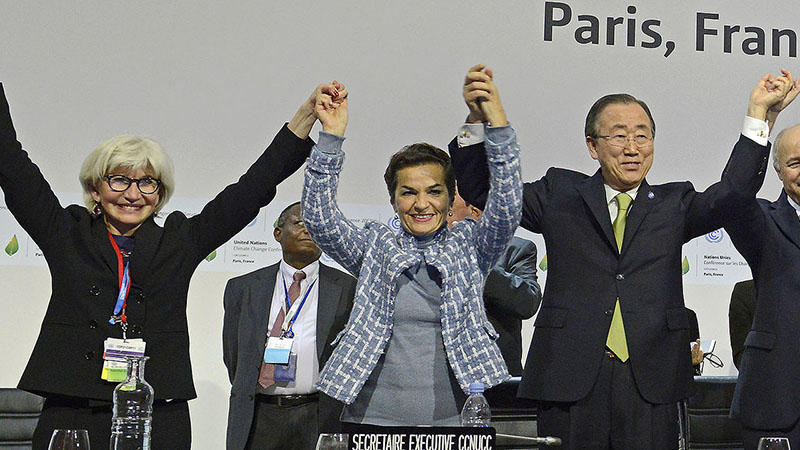On Friday the Paris Agreement enters into force.
Ok, so temperatures won’t instantly plummet. Coal plants won’t power down. Felled rainforest won’t spring back to life.
But from that moment, every country in the world is bound to play their part in slowing and reversing decades of climate change.
The pact depends on leaders living up to their promises.
Much has been written and said about the damage Donald Trump can do if he wins the US presidency, which looks a little less unlikely after the FBI decision over the weekend to look into another batch of Hillary Clinton’s emails.
Analysis: So the Paris climate deal enters into force: then what?
Less attention has been paid to an impulsive strongman already in power on the other side of the Pacific.
Philippines president Rodrigo Duterte has said he will not honour the Paris deal, and while he subsequently backtracked, the country has yet to ratify.
In an article for Manila Bulletin on Saturday, former president Fidel Ramos accused Duterte of “unwittingly shooting himself in the mouth, and also all of us, 101.5 million Filipinos”.
With entire paragraphs in capitals, Ramos strongly urged Duterte to ratify the deal, stressing the Philippines’ vulnerability to global warming impacts.
Renato Redentor Constantino, Executive Director of the Institute for Climate and Sustainable Cities (ICSC), agreed:
“Ratifying the Paris Climate Agreement is in the best interest of the Philippines and the Filipino people. It ensures that our leadership is maintained internationally, and gives us the platform to demand far greater action towards limiting global warming to under 1.5C degrees so we can avoid far worse climate impacts. It would also enable us to seek far greater accountability from industrialized countries…
“Failure to ratify the climate agreement means the Philippines would become an outsider to global climate negotiations.”
Marrakech preparations
Preparations for the next round of UN climate talks are under way, ahead of the 7 November start date. The Africa Group, Least Developed Countries and Association of Small Island States all have pre-COP meetings this week.
Key issues will be holding rich countries to their climate finance promises and making sure the rules for reporting progress are manageable for governments with limited capacity.
Emissions gap
The UN Environment Programme will publish its annual emissions gap report on Thursday, quantifying the distance between ambition and action.
Notably, the media advisory only referred to staying below “the dangerous 2C global temperature rise”, not the 1.5C aspirational goal set in Paris. Does that mean they – like many scientists Climate Home speaks to – believe 1.5C is simply unattainable?
In any case, you can expect more attention on negative emissions technologies this year. Most 1.5C/2C scenarios involve sucking carbon dioxide out of the atmosphere, which comes with big uncertainties.
Pace of change
Looking at that same gap from a different angle, PwC releases its Low Carbon Economy Index on Tuesday, tracking the rate at which G20 countries are decarbonising their economies.
The focus is on carbon intensity, looking at the extent to which GDP growth has been uncoupled from climate pollution.
Climate ambition (doesn’t look like this)
ICYM: the big news from Friday, UN decides to deliver #climate plan for shipping by 2023 https://t.co/UGRuL5YkdN
— Climate Home News (@ClimateHome) October 29, 2016
Brazil coal spat
As revealed in Climate Home earlier in October, fresh from ratifying the Paris deal Brazil’s government then went and authorised some cash for coal.
That went down badly with civil society groups: 60 are asking for a presidential veto to the bill. According to campaigners at 350: “After the approval on the Senate, President Michel Temer has 15 days to approve or reject the new legislation. In case of a veto, the Congress has 30 days to deliberate on it.”
Here’s Carlos Rittl, executive secretary of the Climate Observatory network, which includes more than 40 organisations.
“The same Parliament that did the right thing by ratifying the Paris Agreement in record time now creates a huge embarrassment for the government on the climate conference in Marrakesh”, said Rittl.
“Legislators who approved this program seem to live in a parallel reality, stimulating a power of the 19th century in the country that has more advantages in adopting energy of the 21st century.”
Fossil files
On Friday, oil and gas majors will give an update on their contribution to global climate efforts.
So far, they have mainly focused on cutting emissions from their operations and advocacy of economy-wide carbon pricing.
The true test of seriousness, though, is investment decisions. If they plough money into expensive exploration, that is hard to reconcile with the safe climate future envisioned in the Paris deal.
COP22 in depth: bookmark our dedicated section for latest news & analysis
